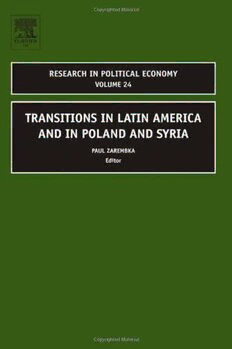
Transitions in Latin America and in Poland and Syria PDF
340 Pages·2007·2.05 MB·English
Most books are stored in the elastic cloud where traffic is expensive. For this reason, we have a limit on daily download.
Preview Transitions in Latin America and in Poland and Syria
Description:
This paper explores the sociological, economic, and political reasons for the collapse of Venezuela's 40-year “pacted” democracy, the eight-year conflict between the country's new president and the opposition, where this conflict has led Venezuela, and what its prospects are for the near future. It proposes that the collapse of Venezuela's “ancien regime” can best be understood by an examination of the impact the rise and fall of oil prices had on its economy, society, and polity. A 20-year economic decline led to the election of Hugo Chavez, a radical outsider, who refused to play along with the country's old political class. This class, in turn, refused to accept Chavez as the legitimately elected president and launched the country on an eight-year roller-coaster ride of counter-revolution and radicalization, which recently ended with the reelection of Chavez and a massive popular endorsement for the establishment of “21st century socialism” in Venezuela. Exactly what such a project means is still unclear, but it so far involves state support for self-managed workplaces and an anti-capitalist and participatory democratic state in the midst of a still functioning capitalist economy. With the apparent defeat of obstacles that are external to the Bolivarian movement, as the pro-Chavez movement is called, such as the domestic opposition and U.S. intervention, the movement is now forced to confront its internal obstacles, such as clientelism, corruption, and personalism, if it is to succeed in the long run.
See more
The list of books you might like
Most books are stored in the elastic cloud where traffic is expensive. For this reason, we have a limit on daily download.
